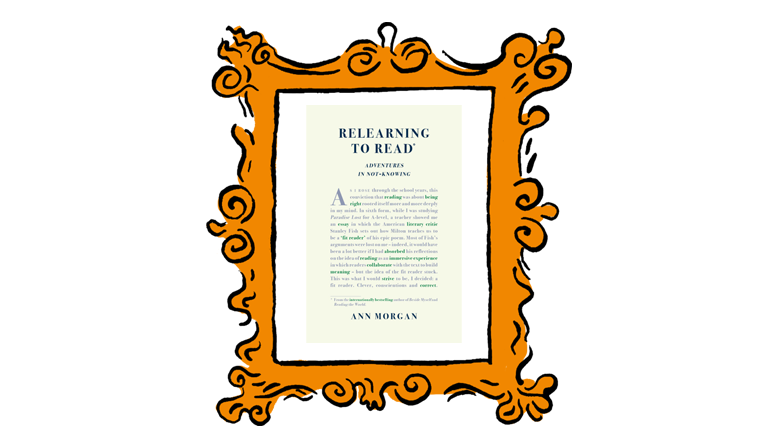Hand-wringing about the state of reading is rife. Children aren’t reading, (many) adults aren’t reading and universities are contending with “post-literate” students: freshers who have come of age on a diet of computer games, short-form videos and aggressive algorithms.
Almost half of adults are not regularly reading by choice, according to The Reading Agency charity (with “reading” being anything from online journalism and books to audiobooks or even social media posts). Men are more likely than women to avoid reading, with 15 per cent of male respondents identifying as “non-readers” compared with 10 per cent of women.
Given this backdrop, the publication of a book called Relearning to Read struck me as a genius move. Its author, Ann Morgan, made her name with a project in 2012 to read a book from every country in a year, which became a hit blog. Who better than her to reinvigorate a habit that even the most literate of us are neglecting in favour of scrolling or slumping in front of variously sized screens?
Except Morgan, who also writes fiction, has a bigger goal in mind than merely getting people to read. The trouble with churning through the bookshelves, as she found on her global literary quest, will be familiar to anyone who remembers struggling with Virginia Woolf at too young an age: how can you understand everything that you read? And, perhaps more importantly, how can you cope when you don’t?
The answer lies in the book’s subtitle: Adventures in Not-Knowing, with bewilderment being crucial to how Morgan wants us to approach reading. This isn’t easy. Incomprehension, she admits, doesn’t come naturally to someone with a first-class degree in English Literature from Cambridge, to someone who spent their formative years becoming the right sort of reader (“a fit reader”, to quote the type of reader Milton wanted for Paradise Lost, one of Morgan’s A-level texts). She was, she writes in Chapter One, which is called “Learning Not to Understand”, “Clever, conscientious and correct. Capable of making sense of any text thrown at me.” Until, on her bibliophilic journey, she found herself adrift.
“If my reading was about making sense of things and being right, how would I handle stories for which I had no contextual knowledge or frame of reference?” At this point, many of us might put down whatever we were struggling with, opting instead for something simpler, knowing, as Stig Abell writes in What to Read Next: How to Make Reading Part of Your Life, that “there will always be a book somewhere to console us”.
Not Morgan, who eschews literary consolation out of necessity. “Anyone who wants to read the world (rather than the Eurocentric canon bolt-on that passed for world literature for much of the twentieth century) will have to accept not-knowing as part of the deal. Because no one can be an expert on all the world’s stories,” she writes. Yielding to confusion helps to turn reading into a “more active, connected and radical pastime”, one with the power not only to change your perspective but to influence which stories reach us and how they are told.
In 12 short chapters, Morgan tackles a wealth of topics, from gender and politics to taste and genre, making a convincing case for how getting comfortable with discomfort and owning our limitations can broaden both our reading and our understanding of the world. The liberation lies in not minding that you won’t understand everything you are reading.
I gave her theory a go this summer, with The House of Rust, which is about Aisha, a Hadrami girl from Mombasa, Kenya’s coastal metropolis. Its author, Khadija Abdalla Bajaber, is also from Mombasa, and is also Hadrami, a migrant group from South Yemen about whom I knew nothing. I picked the book, which was the inaugural winner of the Graywolf Press African Prize, awarded to first novelists from that continent, because I was visiting a friend in Malindi, just up the coast, and wanted something by a local writer. Talking crows, talking cats and vivid sea monsters meant I was out of my comfort zone, often lost in a fable that shimmered with specificity—but I regretted nothing.
Not that writers have to stick to local specifics. In a chapter on redefining authenticity, Morgan explains how Sawad Hussain struggled to find a publisher for her translation of a story collection by an award-winning Syrian author, Shahla Ujayli, only to be told the work was “not Arab enough”. As Morgan points out, “If we are looking for something that matches our sense of what life in a certain region is like, then surely we are not reading the world but reading our world, merely looking for confirmation of our ideas.”
This came to mind last week, when I was listening to Charlotte Mendelson defend her latest novel, Wife—about a lesbian couple seeking divorce—in a kitchen book salon in southeast London. The novel’s flaw, according to one attendee, was its failure to portray lesbian couples positively—or, in other words, Mendelson’s failure to have met that reader’s expectations.
What I like most about Morgan’s approach is how it rips up the rules about reading and reminds us about fiction’s greatest strength: that it lets you step out of your life and, if you’re brave, out of your safe literary spaces. If more of us bear this in mind, maybe more of us will give books another go, even—especially—those about stories and lives we think we might not understand.
Read outside your comfort zone
If we’re to get back to books, then we’re going to have get used to being bewildered
October 02, 2025












